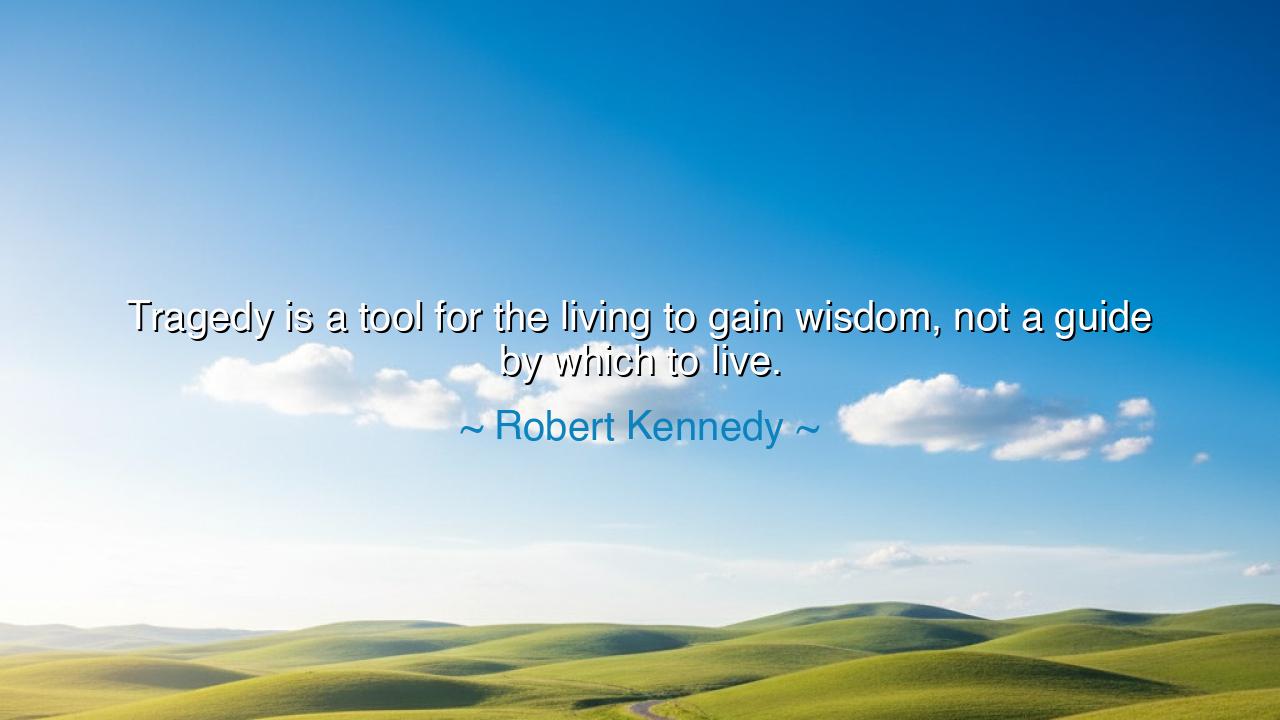
Tragedy is a tool for the living to gain wisdom, not a guide by






Tragedy is one of the great forces that shapes the human soul. It strikes without warning, tearing apart the lives of individuals, families, and nations. When Robert Kennedy declared, “Tragedy is a tool for the living to gain wisdom, not a guide by which to live,” he spoke from the depths of his own suffering and from a profound understanding of the human condition. His words remind us that while tragedy is inevitable, it must not become the foundation upon which we build our lives. It is a crucible for growth, not a blueprint for despair.
To encounter tragedy is to stand at a crossroads. One path leads to bitterness, fear, and the endless repetition of sorrow. Those who let tragedy become their guide allow it to dictate their actions and define their destiny. The other path is the harder one: to treat tragedy as a teacher, to glean lessons from its pain, and to emerge stronger and wiser. This is the way of courage, the way that transforms suffering into strength. Thus, Kennedy’s words are not merely comfort—they are a call to rise above the ruins of grief.
Robert Kennedy himself was no stranger to tragedy. His own brother, President John F. Kennedy, was struck down by an assassin’s bullet, plunging a nation into mourning. Rather than succumb to despair, Robert chose to continue his brother’s vision of justice and unity. He transformed his personal grief into a relentless pursuit of civil rights and compassion for the poor. His life became a testament to the truth that tragedy, though devastating, can ignite a greater purpose when wielded as a tool.
History offers countless examples of this principle. After the devastation of World War II, much of Europe lay in ruins. It would have been easy for its people to surrender to hatred and despair. Instead, nations came together to create new alliances, such as the European Union, built on the desire to prevent future wars. The tragedy of the past became a lesson, guiding leaders to seek peace rather than revenge. In this way, suffering gave birth to a wiser, more unified world.
Let this wisdom be carried to future generations: tragedy will visit every life, but it is not the final word. It is a fire that can either consume or refine. Use it to gain wisdom, to deepen empathy, and to build a life of purpose. Do not allow sorrow to chain you to the past. For though tragedy wounds, it also teaches, and through its painful lessons, humanity can rise ever higher, turning grief into greatness and darkness into light.






Nnhu
This quote raises questions about the temporal and ethical dimensions of suffering. If tragedy is meant for learning, how can future generations benefit from past losses without repeating mistakes? Are there frameworks—educational, cultural, or philosophical—that help people extract lessons from tragedy while still embracing life fully? I also wonder whether some individuals are more predisposed to gain wisdom from hardship than others, and what factors influence that capacity.
HNhieejp Nguyen
This statement prompts reflection on resilience and learning. It seems to encourage using tragedy as a catalyst for understanding rather than as a rulebook for life choices. How do people ensure that the wisdom derived from misfortune informs better decisions without creating undue fear or rigidity? I’m curious about examples where tragedy has been effectively transformed into communal or personal growth, rather than becoming a source of despair or limitation.
DLBa Dat Luong
I feel contemplative reading this quote. It implies that while tragedy is inevitable, the real value lies in how the living respond. How can individuals and communities cultivate the ability to process tragedy constructively? Is there a danger in over-intellectualizing suffering, potentially detaching empathy from action? I’d like insight into practices, whether personal or societal, that allow people to harness tragedy for growth while maintaining engagement and hope.
BTBao Trinh
This perspective feels both practical and poignant. It suggests that tragedy is a reflective tool, not a prescriptive path. I wonder, though, how people differentiate between wisdom gained and trauma endured. Can too much focus on the lessons of tragedy lead to paralysis or pessimism? What strategies exist for transforming sorrow and misfortune into actionable insight without letting it dominate one’s worldview or personal decisions?
DDEWFWE
Reading this evokes a sense of clarity and restraint. It emphasizes that tragedy is meant to teach, not to serve as a framework for living. How can societies and individuals ensure that lessons from past tragedies are applied constructively, rather than used to justify fear or fatalism? I’m curious whether there are cultural or psychological barriers that prevent people from fully internalizing the educational potential of tragedy.